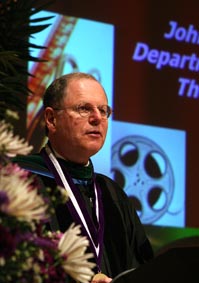 |
| Keynote speaker Dr. Sherman Elias discusses movies’ ability to inform and sometimes mislead audiences about medicine. |
Founders’ Day Highlights Teachers Real and Cinematic
Founders’ Day serves not only to officially welcome entering Feinberg School students but also to honor outstanding teachers and mentors at Northwestern. At this year’s convocation on August 24, the recognition of one faculty member, in particular, demonstrated to members of the Class of 2011 that teaching is an enduring skill and one of the great privileges of joining the medical profession.
Howard S. Traisman, MD ’47, GME ’51, professor emeritus of pediatrics, received the Michael M. Ravitch Outstanding Teacher Award for teaching problem-based learning (PBL) in the first-year medical school curriculum. The PBL Course Committee selected Dr. Traisman based on evaluations received from medical students who had benefited from the tutoring of this alumnus in recent years. Remarked Raymond H. Curry, MD, GME ’85, dean for education, “Howard, I am in awe of your ability to grow and learn with successive generations of medical students so adeptly that they would see you as one of their most effective tutors six decades after you graduated from medical school!”
Dr. Curry also made presentations to other medical educators that the Class of 2011 will likely encounter early in their time at Northwestern. The Dean’s Award for Teaching Excellence went to Joaquin C. Brieva, MD, assistant professor of dermatology; Robert M. Craig, MD ’67, GME ’75, professor of clinical medicine; H. Garry Gardner, MD, professor of clinical pediatrics; Douglas R. Reifler, MD, GME ’92, associate professor of medicine; Eugene M. Silinsky, PhD, professor of molecular pharmacology and biological chemistry; and Katie L. Watson, JD, lecturer in medical humanities and bioethics.
Every year George Joost Awards, determined by student vote for the most outstanding teachers, highlight achievements in basic science teaching and teaching in the Patient, Physician, & Society (PPS) course. For the 2006â07 academic year, the first-year class selected Larry R. Cochard, PhD, assistant professor of medical education, for his fourth Joost award for basic science instruction. Said Dr. Curry, “New students will soon discover that Dr. Cochard is not only an outstanding lecturer and wonderful tutor in the laboratory setting, but also one of the many people students turn to for guidance as they learn how to approach the intellectual and personal demands of medical school.” Applauded by second-year students who appreciated his “enthusiasm, zest for debate, and ‘great magic tricks,’” Ricardo T. Rosenkranz, MD, assistant professor of clinical pediatrics, received the Joost award for PPS instruction.
Second-year students Meghan A. O’Halloran and Jillian A. Havey presented the 2007 American Medical Women’s Association (AWMA)/Upjohn Gender Equity Award to Melina R. Kibbe, MD, assistant professor of surgery. The award recognizes outstanding contributions to the promotion of a gender-fair environment for the training of physicians, according to O’Halloran and Havey, co-presidents of Northwestern’s AWMA student chapter.
Presiding over his first Founders’ Day as dean of the Feinberg School, J. Larry Jameson, MD, PhD, told members of the Class of 2011 that they were entering the field of medicine at an especially propitious time. “The unraveling of the human genome will provide the basis for a new understanding of disease processes and for the development of therapies that were unimaginable even a decade ago,” he said. “Rapid advances in functional imaging of internal organs and the progress of stem cell biology are at the frontiers of medical science. You will have the opportunity to use and help develop these fields throughout the course of your career.”
Keynote speaker Sherman Elias, MD, John J. Sciarra Professor and chair of obstetrics and gynecology, didn’t supply the popcorn but he did treat the audience to a Friday “matinee” of sorts during his talk entitled “Reel Medicine and Science.” Dr. Elias reiterated that the current pace of new technologies and discovery is unprecedented. While these novel developments may someday offer enormous benefits to society, with them come serious ethical, legal, social policy, and public health concerns—either real or “reel” inspired.
“Some areas of medicine and science are perceived as racing ahead of public accountability and effective regulatory control,” remarked Dr. Elias. “Popular culture has a great influence on the medical profession. One of the most powerful cultural mediums in today’s world is the cinema.”
Presenting several movie and television clips, Dr. Elias discussed the ability of entertainment outlets to inform, mislead, frighten, and/or give false hope to viewers and, in turn, patients. “In real life, physicians should inquire about the media perceptions their patients have formed from movies and television and whenever possible provide quantitative data about outcomes,” he said.
Benjamin L. Gray, president of the Medical School Student Senate and a member of the Class of 2009, concluded the convocation by explaining the significance of the white coat. He encouraged first-year students to admire their new shimmering coats as much as they could now because “sadly, for some of you, your coat may never be this clean again.” Laundry jokes aside, Gray told the medical school’s newest students that the coat gained them entry into the world of patient care and showed their commitment to a profession of lifelong learning. Gray then asked the second-year students to stand and help members of the Class of 2011 don their coats. Within minutes the coats were on, and the students were on their way to their first year of medical school.
Posted August 30, 2007






